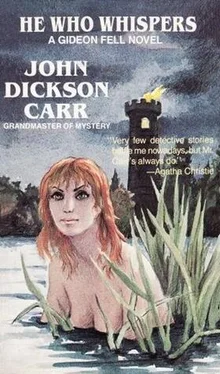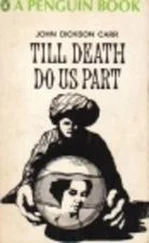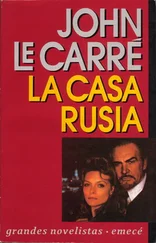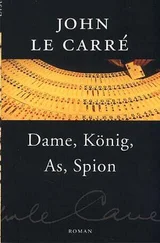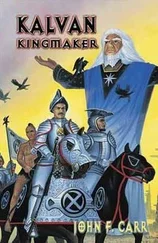“Look here, old man . . .”
“It's all right!” Miles assured him, springing to his feet. “Marion's had a very bad time of it, but she's going to get well. Dr. Garvice says . . .”
“Marion?” Steve's voice went high, and all the colour drained out of his face. “What is it? What's happened?”
“Something or someone got into her room last night, and frightened her very nearly to death. But she'll be as right as rain in two or three days, so you're not to worry.”
For a few seconds, while Miles could not meet his eye, neither of them spoke. Stephen walked forward. Stephen, that self-controlled man, fastened sinewy fingers round the handle of his rolled umbrella; deliberately he lifted the umbrella high in the air; deliberately he brought it down with a smash on the edge of the table under the windows.
The umbrella subsided, bent metal and broken ribs amid black cloth; a useless heap, an inanimate object that for some reason looked pitiful like the body of a shot bird.
“It was that damned librarian, I suppose?” Stephen asked almost calmly.
“Why should you say that?”
“I don't know. But I knew at the station yesterday, I felt it in my bones, I tried to warn you both, that there was trouble coming. Some people cause something-or-other wherever they go.” A blue, congested vein showed at his temple. “Marion!”
“We owe her life, Steve, to a man named Professor Rigaud. I don't think I've told you about him. Don't wake him now; he's had a long night of it; but he's asleep in your room.”
Stephen turned away. He walked over to the line of low white-painted bookshelves along the west wall, with the big framed portraits over them. He stood there with his back to Miles, his hands spread out on the shelf-top. When he turned round a little later Miles saw, with acute embarrassment, that there were tears in his eyes.
Both of them suddenly spoke with desperation of trivialities.
“Did you—er--just get here?” asked Miles.
“Yes. Caught the nine-thirty from town.”
“Crowded?”
“Fairly crowded. Where is she?”
“Upstairs. She's asleep now.”
“Can I see her?”
“I don't know any reason why not. I tell you, she's all right! But go quietly; everybody else is in bed.”
Everybody else, however, was not in bed. As Stephen turned towards the door to the reception hall, there appeared in the doorway the vastness of Dr. Fell, carrying a cup of tea on a tray and looking as though he did not quite know how it had got there.
Ordinarily it would have been as startling to Stephen Curtis to find an unexplained guest in the house as to find a new member of the family at breakfast. Now, however, he hardly noticed Dr. Fell; the presence of someone else only served as a reminder that he was still wearing his hat. Stephen turned in the doorway. He swept off his hat. He looked at Miles. Nearly bald, even his fair moustache seeming disarranged, Stephen struggled for words.
“You and your damned Murder Club!” he said clearly and viciously.
Then he was gone.
Dr. Fell, clearing his throat, lumbered forward hesitantly with the tea on the tray.
“Good morning,” he rumbled. He looked uncomfortable. “That was—?”
“Steve Curtis. Yes.”
“I—ah--made this tea for you,” said Dr, extending the tray. “I made it all right,” he added argumentatively. “And then it seems to me I began concentrating on something else, so that some half an hour elapsed before I put in the milk. I greatly fear it may be cold.”
This remark was both made and received in perfect seriousness, since both Dr. Fell and Miles were otherwise preoccupied.
“That's all right,” said Miles. “Thanks very much.”
He gulped down the tea, and then put cup and tray on the floor beside him as he sat down in the big chair by the fireplace. Miles was steeling himself for the outburst he knew must come, the admission he was compelled to make.
“This whole situation,” he said, “is my fault.”
“Steady!” said Dr. Fell sharply.
“It's my fault, Dr. Fell. I invited Fay Seton here. The good Lord alone knows why I dd; but there you are. You heard what Steve said?”
“Which part of what he said?”
“'Some people cause something-or-other wherever they go.'”
“Yes. I heard it.”
“We were all worked up and overwrought last night,” Miles went on. “When Rigaud made that sign against the evil eye, I shouldn't have been surprised to see hell open. In daylight”--he nodded towards the grey and green and sun-gold forest through the eastern windows—“it's hard to be afraid of vampire-teeth. And yet . . . something. Something that troubles the waters. Something that troubles the waters. Something that brings pain and disaster to whatever it touches. Do you understand?”
“Oh, ah. I understand. But before you blame yourself--”
“Well?”
“Hadn't we better be sure,” said Dr. Fell, “that Miss Fay Seton is the person who troubles the waters?”
Miles sat up straight with a jerk.
Dr. Fell, peering sideways at him past the crooked eyeglasses, with a look of Gargantuan distress on his face, fished in the pockets of a baggy alpaca coat. He produced the meerschaum and filled it from an obese pouch. With some effort he lowered himself into a big chair, spreading out over it; he struck a match and lighted the pipe.
“Sir,” he continued, firing up himself as he blew out smoke, “I could not credit Rigaud's vampire theory from the time I read his manuscript yesterday. I could credit, mind you, a vampire who materialized in the daytime. I could even credit a vampire who killed with a sword-stick. But I could not credit, not at any time, a vampire who pinched somebody's brief-case containing money.
“That jarred my sense of the fitness of things. That somehow failed to convince. And late last night, when you told me Fay Seton's own story—including, by the way, a point which is not in the manuscript—I had a vision. Through the whole business I saw not real devilishness, but human devilishness.
“Then came the frightening of your sister.
“And that was different, by thunder! That was the authentic touch of Satan. It still is.
“Until we know what was in the room, or what was outside the window, we can't give any king of final verdict on Fay Seton. These two events, the murder of the tower and the frightening of your sister are connected. They interlock. They depend on each other. And they both in some fashion centre round this odd girl with the red hair.” He was silent for a moment. “Forgive the personal question; but do you happen to be in love with her?”
Miles looked him in the eyes.
“I don't know,” he replied honestly. “She . . .”
“Disturbs you?”
“That's putting it mildly.”
“Supposing her to be—harrumph!--a criminal of some kind, natural or supernatural, would that have any influence on your attitude?”
“For the love of Mike, are you warning me against her too?”
“No!” thundered Dr. Fell. And made a hideous face and smote his fist on the arm of the chair with remarkable vehemence. “On the contrary! If one wool-gathering idea of mine is correct, there are many persons who ought to get down in the dust and beg her pardon. No, sir: I put the question in what Rigaud would call an academic way. Would this (shall we say) make any difference to your attitude?”
“No, I can't say it would. We don't fall in love with a woman because of her good character.”
“That,” said Dr. Fell, taking a number of reflective puffs at the meerschaum, “is an observation none the less true for not being generally admitted. At the same time, this whole situation disturbs me even more. One person's motive (forgive me if I seem cryptic) seems to make nonsense of another person's motive.
Читать дальше
